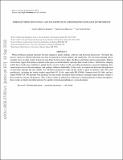Triboelectrification of KCl and ZnS particles in approximated exoplanet environments
Abstract
When mobilized, granular materials become charged as grains undergo collisions and frictional interactions. On Earth, this process, known as triboelectrification, has been recognized in volcanic plumes and sandstorms. Yet, frictional charging almost certainly exists on other worlds, both in our own Solar System (such as Mars, the Moon, and Venus) and exosolar planets. Indeed, observations suggest that numerous planets in the galaxy are enshrouded by optically-thick clouds or hazes. Triboelectric charging within these clouds may contribute to global electric circuits of these worlds, providing mechanisms to generate lightning, drive chemical processes in the atmospheres, and, perhaps, influence habitability. In this work, we explore the frictional electrification of potassium chloride and zinc sulfide, two substances proposed to make up the clouds of giant exo-planets with >50x solar metallicities, including the widely-studied super-Earth GJ 1214b, super-earth HD 97658b, Neptune-sized GJ 436b, and hot- Jupiter WASP-31b. We find that both materials become readily electrified when mobilized, attaining charge densities similar to those found on volcanic ash particles. Thus, if these worlds do indeed host collections of mineral particles in their atmospheres, these clouds are likely electrified and may be capable of producing lightning or corona discharge.
Citation
Harper , J M , Helling , C & Dufek , J 2018 , ' Triboelectrification of KCl and ZnS particles in approximated exoplanet environments ' , Astrophysical Journal , vol. 867 , no. 2 , 123 . https://doi.org/10.3847/1538-4357/aadf36
Publication
Astrophysical Journal
Status
Peer reviewed
ISSN
0004-637XType
Journal article
Description
This research was supported by the Blue Waters Graduate Fellowship.Collections
Items in the St Andrews Research Repository are protected by copyright, with all rights reserved, unless otherwise indicated.

